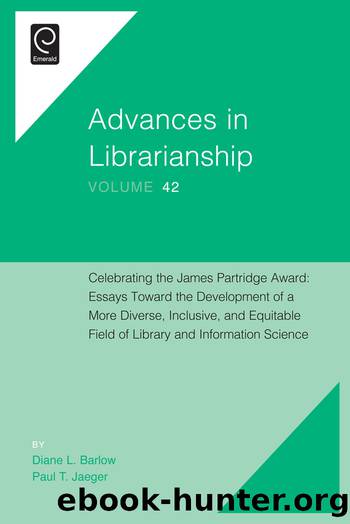Celebrating the James Partridge Award by Barlow Diane L.;Jaeger Paul T.;Barlow Diane L.;

Author:Barlow, Diane L.;Jaeger, Paul T.;Barlow, Diane L.;
Language: eng
Format: epub
Publisher: Emerald Publishing Limited
Published: 2016-12-17T00:00:00+00:00
III. Library School at Case Western Reserve
I enjoyed going to library school. I had to attend library school full time and work full time. The library created a schedule that required me to work all evenings and all weekends. But when you are determined â¦. I finished the masterâs program in 10 months and graduated from Case Western Reserve University in 1977.
I had great professors. One professor made it a point to frequently take his students out of the classroom and into the field to visit various libraries, meet with library managers, and discuss library operations. I was the only African American in the class; during our field trips we had the opportunity to visit many libraries, including public libraries located in African American communities.
Unfortunately, the libraries within the African American communities were under siege by the director of the cityâs large urban library system. The library administration felt a need to close these facilities due to lack of use. They felt that African Americans did not regard libraries as important and that closing a facility would not create a hardship for the African American community. In their view, it was a poor investment to pay for gas, electricity, and staff of a facility that was not being utilized or appreciated by members of the community. In their opinion, libraries were designed for the educated elite, the well-to-do, the white members of our society. One branch being considered for closing was a branch that I had visited as a child; it was located only a few blocks from where I lived. I felt obligated to address this situation. I had a personal responsibility at stake, to alter this antiquated and ridiculous trend of thinking that might eventually altogether eliminate the presence of public libraries in our African American communities.
A month or so later, I completed my graduate work and received my degree. I was honored to have successfully completed graduate school, to receive my M.L.S., and to drop the title of paraprofessional forever. Yet, the closing of these branch facilities never left my mind. After three months of tossing the issue around in my head, I decided that I would investigate applying for admission to the Ph.D. program in library and information science. Enrolling in the program would provide the opportunity to further my education, and in doing so, I would have the opportunity to address the issue involving the library closings from a scholarly perspective, or so I believed.
I scheduled an appointment with the assistant dean, and we met in his office shortly after. I shared my desire to enter the Ph.D. program. The dean was supportive until we discussed my area of concentration following course work. I explained that I wanted my thesis to concentrate on âThe Survival of Public Libraries in African American Communities.â His immediate response was, âWhy?â I shared my experience while in graduate school and my concern over the possible closings. I explained that knowledge gained through my research while in the Ph.D. program might enable me to assist in keeping the doors of these libraries open.
Download
This site does not store any files on its server. We only index and link to content provided by other sites. Please contact the content providers to delete copyright contents if any and email us, we'll remove relevant links or contents immediately.
| Anthropology | Archaeology |
| Philosophy | Politics & Government |
| Social Sciences | Sociology |
| Women's Studies |
Nudge - Improving Decisions about Health, Wealth, and Happiness by Thaler Sunstein(7250)
iGen by Jean M. Twenge(5166)
The Fire Next Time by James Baldwin(5024)
Adulting by Kelly Williams Brown(4238)
The Hacking of the American Mind by Robert H. Lustig(4092)
The Sports Rules Book by Human Kinetics(4079)
The Ethical Slut by Janet W. Hardy(4042)
Captivate by Vanessa Van Edwards(3732)
Mummy Knew by Lisa James(3522)
In a Sunburned Country by Bill Bryson(3374)
The Worm at the Core by Sheldon Solomon(3327)
Ants Among Elephants by Sujatha Gidla(3282)
Suicide: A Study in Sociology by Emile Durkheim(2906)
The Slow Fix: Solve Problems, Work Smarter, and Live Better In a World Addicted to Speed by Carl Honore(2839)
The 48 laws of power by Robert Greene & Joost Elffers(2814)
Humans of New York by Brandon Stanton(2690)
Handbook of Forensic Sociology and Psychology by Stephen J. Morewitz & Mark L. Goldstein(2604)
The Happy Hooker by Xaviera Hollander(2586)
The Tipping Point by Malcolm Gladwell(2563)
